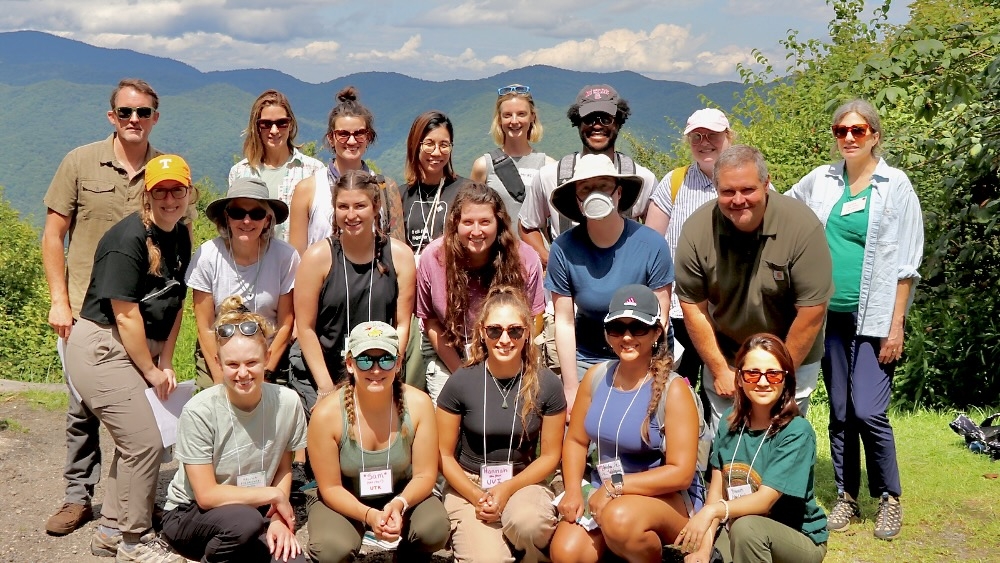Celebrating the First Graduates of the Participatory Sciences Certificate
The Global One Health Academy and Citizen Science Campus are excited to announce the first graduates of the Participatory Sciences Graduate Certificate. This interdisciplinary certificate trains graduate students to address pressing global issues through collaboration with the public on scientific research. Congratulations to Marcus Bailey (CNR) and Alejandra Betancourt (CNR)! Check out the interview below to learn more about these two students.
1. What degree program are you in, and what do you study?
Bailey: I earned a Master of Science in Natural Resources with a concentration in Policy and Administration. I used a participatory research method called Collective Memory Work to understand the experiences of Black people who engaged in outdoor participatory science projects. My thesis and coursework were predominantly overseen by my advisor, Dr. Caren Cooper. Dr. Corey Johnson helped with my methodology (that being Collective Memory Work) during the research process.
Betancourt: I am pursuing a Ph.D. in Forestry and Environmental Resources in the College Natural Resources. My current research focuses on studying the urban forests in Raleigh’s Greenway system. I assess the overall condition of the trees and analyze vine occupancy in these forested corridors.
2. What skills did you gain through completion of the Participatory Sciences Graduate Certificate? How have these skills helped advance your research?
Bailey: “Citizen Science and Other Participatory Methods” was a core required course for the Certificate. It helped me gain skills in qualitative research and become familiar with theories and practices associated with the participatory sciences. The other required course, “Participatory Science Practicum”, aided me throughout the latter stage of my research and gave me a broader perspective on this type of work and the field. It also gave me more first-hand experience and exposure in helping manage the ins and outs of a program. The Pack Science Challenge is the one that I worked on during that course.
The skills I gained were focused on team management, project management, additional graphic design experience, and a strengthening of communication skills. This also gave me additional public speaking experience and a deeper understanding of logistics.
Betancourt: Through this certificate, I gained knowledge and skills in community engagement, including local and scientific perspectives and the importance of collaborative research design. These skills, in my current research, help me find stakeholders and envision a better urban forest with the participation of the whole community. I have always seen the value in sharing knowledge through participatory science and learning how the community (both scientists and non-scientists) can benefit by creating more impactful and accessible research. This certificate helped me organize those ideas within a more rigorous and structured framework, and I gained more profound knowledge in the process.
3. What are your future career plans? In what ways do you anticipate using participatory sciences in this career path?
Bailey: Currently, I’m looking to jump into a doctoral program at NCSU. My goal is to study participatory sciences in China. I want to visit China through a study abroad program. I want to understand the role of language in academia, science, and participatory sciences in a non-Western context. I will also work on my passion projects, such as becoming an independent creator within the art world and establishing myself in the language learning community.
Within a few years, I’m aiming to pursue educational, living, and job opportunities in China while also expanding the fields of work I am capable of doing. Notably, the aforementioned work within Visual Arts and Language Learning. I would aim to enter a Chinese University (like Sichuan University or Beijing Language and Culture University) for either another master’s program or a doctoral program, and afterwards make the transition into a gradual life within the country.
Betancourt: I aim to continue on an academic and/or research path. Participatory science will be included in both research and teaching approaches. Regardless of my next steps, I see the value of participatory science across its many forms and branches, and because I have always enjoyed working with forests, I would love to continue on that path and focus future work on community-based participatory research and local knowledge.
This post was originally published in Global One Health Academy (GOHA).
- Categories:


